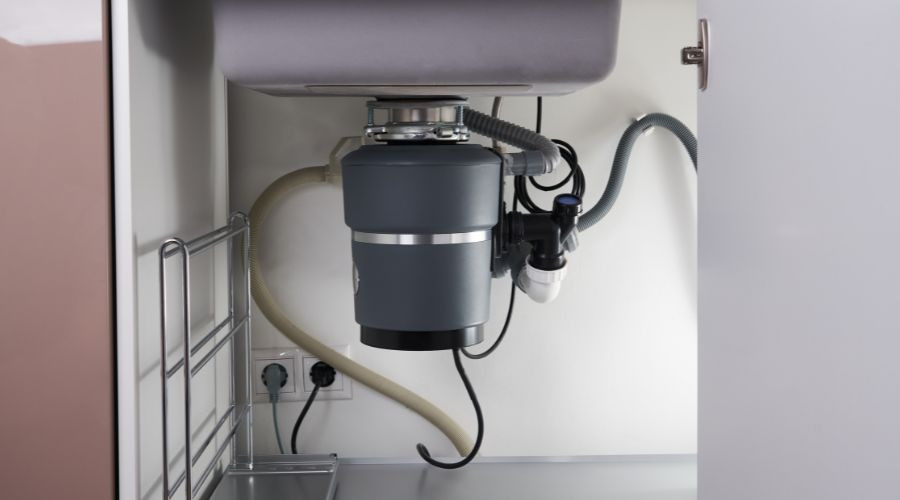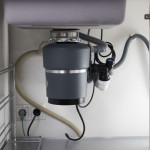Tips to Help Keep Garbage Disposals Running Smoothly
In the kitchen, the garbage disposal plays an important but often overlooked role until it stops working properly. A malfunctioning garbage disposal can disrupt routine and lead to a sewer line clog since garbage disposals grind food waste into smaller particles, making it easier to dispose of through the plumbing system.
However, with a few simple maintenance habits, including knowing what should and shouldn't go down the drain, homeowners can help avoid those inconvenient breakdowns and help prevent a clogged sewer line. This post will share some practical tips to keep garbage disposals running smoothly.
Know What Can and Can’t Go Down the Disposal
 A garbage disposal is designed to handle certain types of food waste, but not everything should go down the drain and the disposal. Food scraps that should never be put in garbage disposals to prevent clogs and disposal problems include:
A garbage disposal is designed to handle certain types of food waste, but not everything should go down the drain and the disposal. Food scraps that should never be put in garbage disposals to prevent clogs and disposal problems include:
- Fibrous or stringy foods like celery, corn husks, artichokes, and more
- Starchy foods such as pasta, rice, potato peels, and more
- Hard items, including nuts, bones, fruit pits, and seafood shells
- Grease, fats, and oil
- Coffee grounds and
- Eggshells
Foods that can be put safely down the disposal include fruit and vegetable scraps, except for the exceptions like fibrous veggies and potato peels, citrus peels, which can actually help clean and freshen the unit, and small pieces of cooked meats. When in doubt about whether something can go down the disposal, it’s best to be cautious by throwing it in the garbage. Proper disposal habits will significantly extend the life of the garbage disposal unit, prevent costly repairs, and help avoid clogged sewer lines.
Use Cold Water and Ice
 Cold water is the unsung hero of garbage disposal maintenance. Unlike hot water, which can melt fats and grease that have unintentionally ended up in the disposal, causing them to re-solidify further down the pipes and cause clogs, cold water keeps these substances solid so they can be properly chopped and flushed away. Always run cold water before turning on the disposal, continue running it while the unit operates, and let it flow for 15-20 seconds after turning off the disposal.
Cold water is the unsung hero of garbage disposal maintenance. Unlike hot water, which can melt fats and grease that have unintentionally ended up in the disposal, causing them to re-solidify further down the pipes and cause clogs, cold water keeps these substances solid so they can be properly chopped and flushed away. Always run cold water before turning on the disposal, continue running it while the unit operates, and let it flow for 15-20 seconds after turning off the disposal.
For a deeper clean, ice cubes are remarkably effective. Routinely drop a handful of ice cubes into the disposal along with cold water. As the disposal crushes the ice, the frozen chunks help remove food particles from the grinding components and inner walls that may have gotten stuck. This helps keep the garbage disposal clean and helps prevent bad smells from the unit.
Don’t Put Too Much Down the Disposal at Once
Even when putting food scraps in the disposal that can go down garbage disposals, problems can still arise when the items are too large or too much is put in the disposal at once. Overloading garbage disposals with large quantities of food waste at once can strain the motor, jam the grinding mechanism, clog the sewer line, and potentially lead to needing garbage disposal repair.
Instead, people should feed food scraps gradually into the disposal in small batches, allowing each portion to be fully processed before adding more. For larger items such as fruit peels or vegetable trimmings, take the extra time to cut them into smaller, more manageable pieces before disposing of them. When people overload the unit, food particles may not be properly broken down in the disposal, leading to clogs further down the plumbing system.
About Hancock & Son Plumbing, Heating and Air Conditioning
Hancock & Son Plumbing, Heating and Air Conditioning is a locally owned and operated company serving Salisbury, MD, and the surrounding areas. They offer honest pricing, personalized service options, and expert workmanship. Call them for kitchen plumbing and garbage disposal services in Salisbury, MD.



